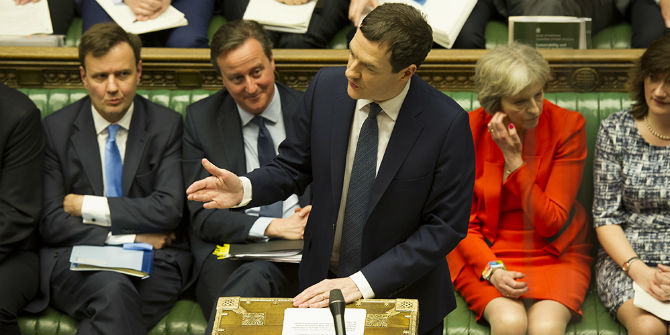 The UK has drawn several red lines ahead of the Brexit negotiations. But will we be able to secure a favourable exit deal from the EU? Bob Hancké says the negotiating tactics that served the UK well when it was actually a member will be far less effective now – because the EU no longer has an interest in compromising in order to keep Britain on board.
The UK has drawn several red lines ahead of the Brexit negotiations. But will we be able to secure a favourable exit deal from the EU? Bob Hancké says the negotiating tactics that served the UK well when it was actually a member will be far less effective now – because the EU no longer has an interest in compromising in order to keep Britain on board.
Judging by the Brexit debate in Britain, the UK will decide what deal it wants with the EU, what it negotiates and what it receives. Not a single day seems to pass without newspapers reporting on yet another way that the UK will redefine its relationship with the EU during and after Brexit: access to the single market, a bespoke deal, taking back control of the borders, passporting rights for financial services, to name a few doing the rounds. It’s as if the country is saying: ‘We decided to leave and we will also decide how we will do it’. End of conversation, as Tony Soprano used to say.

There are two big problems with this approach to Brexit. The first is simply that the procedure of Brexit, as captured in the famous Article 50, massively skews the process against the departing member state. Even if the EU is trying to be nice – as it should, and as it more or less does – it calls the shots in the negotiations.
The second is related to the dynamic of what political scientists call a two-level game, made famous by Robert Putnam many years ago. It refers to a setting in which international negotiations are embedded in domestic arrangements and vice versa. An EU member state can always claim that it would never be able to persuade its constituencies (citizens, MPs, or relevant interest groups) of the benefits of the prospective deal; for it to be accepted at home, it would need to be closer to that member state’s preferred outcomes. The UK actually excelled in that game with its red line policy; for some, it explains why the EU is much more of a neoliberal system than we would expect, given the socio-political proclivities of most of the member states of the EU.
In the run-up to negotiations with the EU, the UK is busy drawing red lines, much in the same way that it did when still a ‘standard’ member of the EU. That way of handling negotiations worked very well because of the particular mode of decision-making in the EU, which rewards recalcitrant members (technically called the joint-decision trap: the EU’s decision-making system requires that more or less all member states have to agree to significant changes in modes of operation). As a result, a brilliantly ironic dynamic sets in, in which the most recalcitrant member ends up with more of what it wants out of the EU than the more enthusiastic members (yes, it does make you wonder why the UK wants to leave the EU if this is the case). Since negotiations usually end up where two can find common ground, it pays the recalcitrant member state to remain stubborn, thus reducing the place where everyone can agree to something that almost perfectly resembles its own agenda. It needs to keep its win-set of acceptable options small, in the knowledge that the others would rather negotiate a relatively weak deal than no deal.
Armed with that knowledge (and with, perhaps, a misplaced arrogance about going it alone in the turbulent world we live in), the UK draws up its plan for Brexit and seems to assume that the EU will take that as the parting shot. The EU may do that. Stranger things have happened in the past twelve months. But the EU is more likely to look at this as a psychodrama in which it doesn’t really want to participate (which seems to be the prevailing mood elsewhere in Europe since David Cameron’s fated call for a referendum).
Here’s the idea: two-level game tactics, in which you reduce your win-set with a view to maximising the chances of your preferred option carrying the day, work if everyone prefers staying together over not finding a solution. This is known as a battle of the sexes game: John wants to go to the football game while Mary wants to go to the theatre, but both want to do something together rather than go alone. A battle of the sexes game is about the unequal distribution of outcomes when both want to cooperate. So, as long as the UK is in the EU, being a slightly recalcitrant member works in its favour because the rest of the EU wants a deal more than no deal.
While it works well as long as the UK wants to remain an EU member, the two-level game tactics backfire when you are negotiating leaving the EU. Drawing red lines when you don’t want to cooperate anymore is massively counterproductive, even if you negotiate among equals but certainly if the other party controls the process. Since there is de facto no second level anymore – the UK has had its Brexit vote and, as Theresa May reminds us almost daily, Brexit means Brexit – the UK no longer is able to use that as a way of forcing other EU member states to inch closer to its preferred outcome. It is, indeed, much simpler to negotiate opt-outs during forty years of membership than opt-ins when leaving the EU.
This post represents the views of the author and not those of the Brexit blog, nor the LSE. it was first published at EUROPP – European Politics and Policy.
Bob Hancké is Associate Professor in European Political Economy at the LSE. His research interests include the political economy of advanced capitalist societies and transition economies as well as macro-economic policy and labour relations. His books include Unions, Central Banks, and EMU: Labour Market Institutions and Monetary Integration in Europe (Oxford University Press 2013), Intelligent Research Design (Oxford University Press 2009) and Debating Varieties of Capitalism (Oxford University Press 2009).







(yes, it does make you wonder why the UK wants to leave the EU if this is the case).
Actually, no it doesn’t.
(and with, perhaps, a misplaced arrogance about going it alone in the turbulent world we live in),
To paraphrase the immortal words, Well, you would say that, wouldn’t you?
You are aware of the £68 billion pa. trade deficit between the UK and the EU, the huge Primary Income Deficit, the imbalance of UK manufacturing and services etc.? It is not just “free movement of labour” that makes the EEA/Single Market undesirable, it is the entire economic relations between the UK and EU.
The ideal is for WTO Rules Trading between the UK and EU for about 10 years- until the huge imbalances that have occurred since the 1990s are corrected. Given that the UK should be seeking no more than MFN status with the EU all that is required from negotiations is to tie up lose ends such as reciprocal healthcare, migrant rights etc.
Your article doesn’t seem to take account of the fact that Brexit must mean Brexit.
The “two level game” bit hits the nail right on the thumb there: it’s how the federalist faction got away with increasingly absurd demands at every turn (a flag, an anthem, embassies, a “foreign policy”, three “Presidents” – what next, pet unicorns?), until they finally reached breaking point, where no membership at all became preferable to funding the growing fiasco. If only the UK really had been “awkward”: rejecting Maastricht, the ERM and Lisbon, for starters, instead of taking the myopic view that each step only took us a small distance in the wrong direction, so that was somehow OK.
Meanwhile, the public negotiating stance of the EU-27 amounts to naming comical sums of money they expect to pocket – and no interest or willingness whatsoever to act to support their own nationals who emigrated to the UK. Hardly promising – but behind closed doors, apparently most (with the notable exception of Merkel, of course) actually admit the importance of protecting their constituents’ interests, rather than treating the negotiation as a game-show style cash grab to plug their short-term budget shortfalls.
Either way, we automatically ditch the most toxic baggage: the “ever closer union”, having our foreign policy dictated to us by foreign governments, and having to pay a levy on all our imports to Brussels (and thus have Brussels cause tariffs to apply to our exports as well) unless we can get permission from an obscure corner of Belgium to be permitted to have a proper free trade agreement.